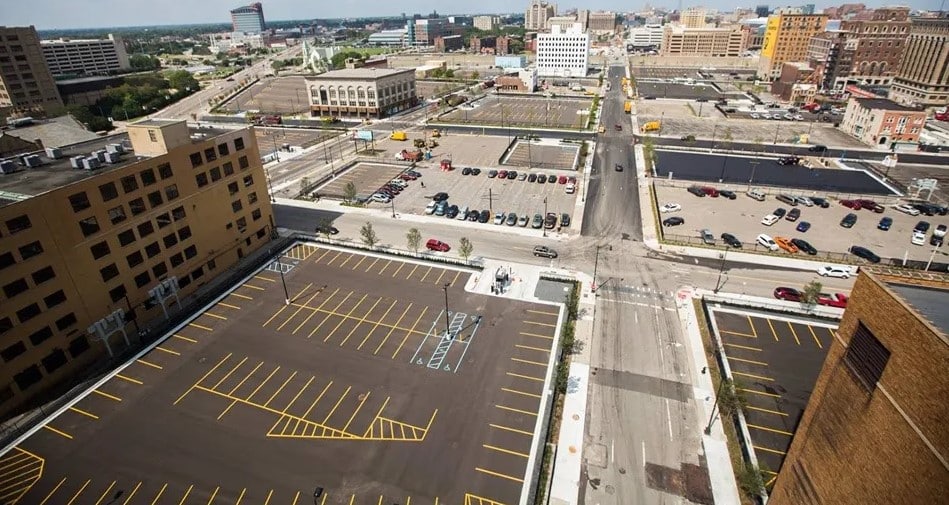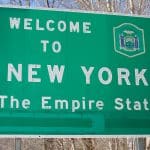Fans of Joni Mitchell will remember this chorus of her classic tune “Big Yellow Taxi”: Don’t it always seem to go / That you don’t know what you got ’til it’s gone? / They paved paradise, put up a parking lot.
The message of that golden oldie could be recalled by anyone who read a story on Axios last month titled “Study: Nearly a third of downtown Detroit is parking.” Whether one equates Detroit with paradise is strictly subjective, of course, but it is hard not to see the connections between the Joni Mitchell lament and the state of downtown Detroit, which has more parking lots or garages than most major U.S. metros. According to Parking Reform Network, 30% of the city’s central business district is occupied by parking facilities.
The advocacy group Detroiters for Parking Reform view this glut of parking facilities as being a major obstacle in rejuvenating the city’s downtown.
“Every acre of land dedicated to parking is an acre that can’t be used for jobs, housing, businesses or parks,” said the group in a press statement issued last fall, adding that a moratorium on new lots should be enacted until the city government does a proper analysis of the surplus number of parking spaces.
One question that does not get raised is, quite frankly, the most obvious: why are developers so eager to build parking lots in Detroit? It would seem clichéd to point this out, but Detroit is the Motor City, so the fondness for automobiles is no surprise. But a University of Michigan study observed a data that unevenly divides this metro between the haves and have-nots.
“Almost two-thirds of Detroiters (63%) own or share a vehicle with someone in their household, while one-third (34%) do not,” the study said. “Many stories have been written about young, affluent urban dwellers choosing to live without cars, but the data show that at least in the Motor City, living without a car is rare among educated middle- and upper-income residents and more common at the low end of the socioeconomic scale.”
The study also observed that “no other transportation option comes close to driving in terms of daily transportation. The second most common form of daily transportation used by Detroiters is walking or riding a bike somewhere, which 13% say they do daily, though six in ten (59%) do sometimes. Additionally, few Detroiters take a bus on a daily basis (7%), but almost half (45%) do at least occasionally. Ride-hailing services, such as Uber or Lyft, are used daily or almost daily by very few Detroiters (1%), but a quarter (25%) use them at least occasionally.”
Also to be considered – and rarely acknowledged aloud – is the safety of being in a car. This is not to say that a person is immune from crime when driving in an automobile, but the likelihood of being robbed and assaulted is significantly lower than being a pedestrian or waiting for mass transit. And Detroit, sadly, has a serious crime problem that is showing no signs of abating. Last month, WalletHub released a report on homicide rates in major cities and Detroit ranked fifth for homicides per capita. And last month, city and federal local law enforcement offices announced the “One Detroit” partnership to fight the rise of violent crime across the city.
“One Detroit seeks to disrupt violence in our neighborhoods by focusing law enforcement resources on the drivers of violent crime, supporting community-based solutions to prevent crime, and ensuring that individuals returning from prison have sufficient supports to take full advantage of their second chances,” said Dawn Ison, U.S. Attorney for the Eastern District of Michigan, at a press conference unveiling the effort.
But in some sections of the city, there is a call for more parking spaces and facilities – particularly in the retail business corridors within several Detroit neighborhoods. Last November, the hyperlocal media source Bridge Detroit reported the City Council approved a $9 million with the Detroit Building Authority for the creation of new parking spaces in business corridors in predominantly residential areas. The land to be used for this endeavor are vacant lots owned by the city or the Detroit Land Bank Authority.
“The community and business owners have been vocal about the shortage of dedicated parking along commercial corridors, and it was also a frequent topic of discussion during the Strategic Neighborhood Fund community engagement process,” said Dan Austin, director of communications for the city’s Planning, Housing and Development Department, who added about 400 new spots will be built over the next two years.
And parking lots are playing a major role in the city government’s next initiative – installation of a new wave of electric vehicle chargers.
“We have been, for the last 100 years the home of the automotive industry,” said Tim Slusser, chief of mobility innovation for the City of Detroit, in a CBS News interview. “We’re now embracing what the next 100 years is going to look like. We want to create opportunities for all Detroiters to charge their vehicles here.”
Slusser added that all Detroiters – including the city’s real estate sector – will benefit from this plan.
“We’re actually providing better outcomes, environmental, health outcomes for all Detroiters by working toward zero emission transportation,” he said.
Photo of downtown Detroit’s multiple parking facilities courtesy of Detroiters for Parking Reform














